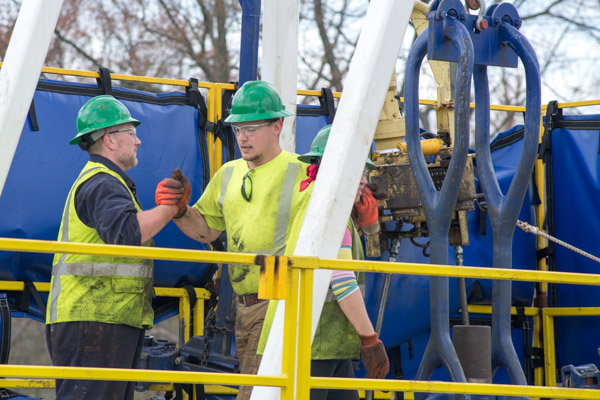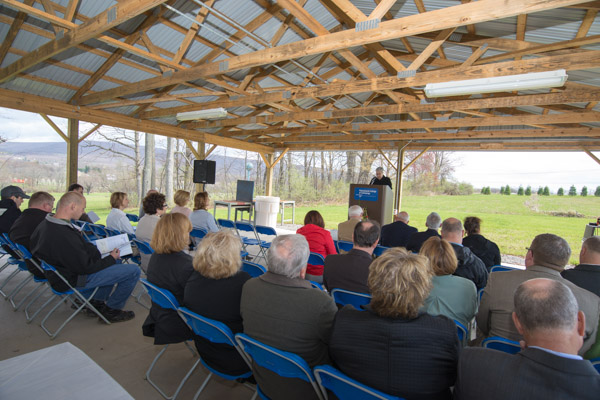Penn College Dedicates Rig Simulator Used in Natural Gas Training
Friday, May 2, 2014
The simulator was purchased with U.S. Department of Labor, Employment and Training Administration, Trade Adjustment Assistance Community College and Career Training funds. In addition, New Pig, of Tipton, donated a protective geosynthetic membrane that was installed beneath the rig simulator.
 The simulator provides students in ShaleNET’s noncredit, short-term roustabout and floor hand courses with hands-on training opportunities. Plans include making the simulator available to train new short-service employees for private drilling companies. Also under consideration is training of other populations, such as veterans.
The simulator provides students in ShaleNET’s noncredit, short-term roustabout and floor hand courses with hands-on training opportunities. Plans include making the simulator available to train new short-service employees for private drilling companies. Also under consideration is training of other populations, such as veterans.Speakers at the ETEC ceremony were Penn College President Davie Jane Gilmour; Board Chairman Sen. Gene Yaw; Tracy L. Brundage, assistant vice president for workforce and economic development; Lycoming County Commissioners Chairman Jeff C. Wheeland; and Brian Young, district operations manager for Trican Well Services, Mill Hall.
“This piece of equipment allows students the opportunity to learn the basic skills and safety procedures used on a typical drilling site in the natural gas industry,” Gilmour said. “The rig simulator is a wonderful addition to the wide range of training resources offered here at the ETEC and reinforces our commitment to hands-on learning in real-world work environments.”
“The natural gas industry is employing thousands of Pennsylvanians and providing millions of dollars in economic benefit to landowners and local governments all throughout my district,” Yaw said. “The Pennsylvania College of Technology is recognized as a leader in providing educated, skilled workers for this new industry in our region. The equipment being dedicated today will certainly enhance the college’s standing in the industry.”
Students working on the drilling rig simulator learn about safety and rig fundamentals (including proper use of a slip, tongs, pipe spinner, bails, elevator, and connecting and disconnecting drill pipe), as well as teamwork skills.
“With this training apparatus – one of only three nationwide – crews of students receive proper instruction on hand placement, safe operation and the fundamental operations of an actual drilling rig,” Brundage said. “This makes for a very comprehensive educational experience and assists students in becoming qualified prospects for potential employers in the oil and natural gas industry.”
Wheeland said he is pleased with the result of the Lycoming County Commissioners investing Act 13 funds for ShaleNET training at Penn College.
“I believe we are the only county in the commonwealth to invest Act 13 funds for training,” he said. “What I find most rewarding is that we trained almost 50 residents – half of them were unemployed and five are veterans – and placed 95 percent of them in jobs paying $13.50 to $21.75 per hour. These are gateway jobs that afford graduates wide-open opportunity to advance into higher-skilled jobs or move into other sectors of the industry. By committing these funds, we are doing good things for our residents and, in the long run, for the economic well-being of Lycoming County.”
Invited guests observed a training exercise on the drilling rig simulator and had the opportunity to tour the rest of the ETEC. A collaboration with the Lycoming County Department of Public Safety, the ETEC facilitates hands-on training for workers in the natural gas industry, as well as emergency-response personnel.
In addition to the rig simulator, the site features live fire “props,” a wellhead, separator, meter house, flammable-liquids simulator, tank battery, hydraulic fracturing-site display, pressurized production-site setup, sand separator, pig launcher and receiver, and miscellaneous static props.
Through industry donations of equipment and accessories, the ETEC plans to employ additional instructional props to train completion technicians on the fundamentals of assembling, disassembling and maintaining hydraulic fracturing equipment.
Also being developed at the ETEC is a gas-distribution area to show students the proper procedures for connecting and disconnecting piping to move natural gas, how to operate meter runs, how to measure gas flow, and how to track gas flow using SCADA (supervisory control and data acquisition).
For more on the Shale Training & Education Center at Penn College, visit on the Web.
More information about natural gas-related academic majors at Penn College is available online.
− Photos by Cindy Davis Meixel, writer/photo editor

The students introduce themselves prior to the training exercise ...

The crew goes about its work ...

... proving there's nothing simulated about elbow grease and determination.

A handshake for a well-done job

State Sen. Gene Yaw, chairman of the college board of directors, talks with students near the end of their two-day training on the rig.

ShaleNET U.S. project director Alice M. Schuster, joined by consultant/instructor Rex E. Moore (background), greets students.

... enjoying the camaraderie amid the serious hands-on tasks ahead.

Penn College President Davie Jane Gilmour addresses the dedication audience.